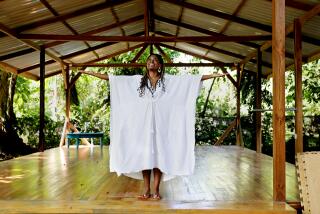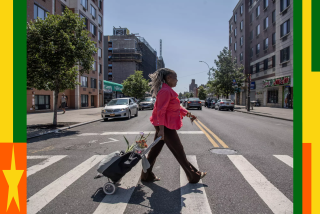Back to Africa, From Iraq
BASRA, Iraq — His ebony skin, curly hair and facial features distinguish Mohammed Abbass as a man of African descent. But he has never set foot in Africa and knows little about the continent and its people. As long as he can recall, his forefathers have lived in Iraq, and his roots are deep in this Middle Eastern country.
“Of course I consider myself to be Iraqi,” said Abbass, 35, a carpenter. “I don’t have any knowledge about my history.”
But that is something that Abbass, typical of the tiny percentage of blacks who have been a part of Iraqi society for centuries, wishes he could change. As has long been the case among African Americans and Caribbean blacks, many black Iraqis, most of them presumed to be the descendants of slaves, are keen to learn about their heritage.
“I have a wish to know what my history is,” said Abbass, whose mother tongue is Arabic. “I also want to go to Africa to see what’s there.”
With the collapse of the despotic government of Iraqi leader Saddam Hussein, that eventually may be possible, as ordinary Iraqis consider a future of more opportunities and liberties.
For now, the demise of the former system has left government agencies and administrative departments in disarray, making access to statistical information on the ethnic breakdown of Iraq’s population of 23 million difficult to obtain. Still, some academics put the number of Iraqis of African decent at about 1%, though others believe that figure could be as high as 5%.
Blacks are an intrinsic part of Iraqi society, and generally are treated as such. Some have ascended to significant positions in academia, trade and other professions. Like other Iraqis, they speak Arabic, and most are Muslims belonging to the country’s Shiite majority or the Sunni minority.
“We are just like any other Iraqis, no different,” said Marydosh Abbass, Mohammed’s 72-year-old father, who recalled that his grandfather bore facial markings typical among certain African communities.
But some black and nonblack Iraqis acknowledge that some racial discrimination persists, and dark-skinned Iraqis often are viewed as less attractive and even inferior.
Blacks have tended to live together in such areas as the ancient and decrepit Qibla Sufat neighborhood of this southern Iraqi city. Few blacks rose to political prominence under Hussein, and many are said to have participated in the 1991 uprising against the dictator’s regime.
Historical data confirm a link between Africa and the Arab world dating back as many as 1,500 years, when African villages were raided and thousands of people were taken as slaves to the Middle East, including present-day southern Iraq, Kuwait and Iran.
The slaves initially came from East Africa, including areas that became the countries of Ethiopia, Somalia and Sudan. They were referred to as “Zanj,” which academics believe is related to the word “Zanzibar,” an island off the east coast of Africa -- today part of Tanzania -- which was also once a major exporter of human cargo.
As the demand for labor grew, Arab slave traders reached deeper into the continent. And by the 19th century, Basra -- now home to the largest concentration of Iraqi blacks -- had become a prosperous slave port.
Little is known about Iranians and Kuwaitis of African descent. According to historical accounts, the slaves brought to Iraq were used for pearl diving, date farming and the back-breaking, often dangerous work of building canals and clearing salt marshes for planting crops.
U.S. academics say African boys were sometimes castrated and made to serve as eunuch guards of royal harems. African women were often forced to be concubines. But some slaves were treated as indentured servants and some could buy or earn their freedom; others became soldiers, who also were liberated.
As many slaves began to convert to Islam, they were spared bondage because Islamic law forbids the enslavement of Muslims. Children born to a Muslim master and slave also were considered free, historians say.
Some blacks managed to rise in social status. Bilal Rabah, an Ethiopian slave, became the first Muslim muezzin -- the man who calls the faithful to prayer -- during the early Islamic era and the time of the prophet Muhammad.
Abdulrazzaq Abduljaleel Ibrahim believes he is a direct descendant of Rabah. The retired soldier, who was injured during the 1980s Iraq-Iran war and walks with a cane, said his family has lived in the same Basra stone house for 500 years.
In a back storeroom lies a treasure trove of heirlooms. He carefully dusted off a big wooden drum, in his family for 300 years and restored several times. He blew through a large seashell that in Africa would have been used to summon people together.
As he sat cross-legged and gently strummed on a traditional African harp-shaped instrument known as a tampora, Ibrahim sang words from a language he doesn’t understand. The lyrics were passed down through generations. The only word he recognizes is simba, or lion, in the East African language Swahili.
If he ever had a chance to visit Africa, Ibrahim said, he would be full of questions.
“I would like to know information about our African origins and the kind of things that we still maintain from our origin,” said Ibrahim, 45, the father of three children. “How they use the instruments I have here. Do they still have the same name, the same music? And the words I am using, am I pronouncing them the same way or not?”
Ibrahim’s sister Rabia Abduljaleel Ibrahim, 63, said: “I would like to know where my grandfathers were living. Although it is a long time ago, we still feel a connection, the customs, the blood.”
Many black Iraqis have managed to preserve that bond through spiritual beliefs, traditional African herbal healing methods and inherited songs and dance. For example, the haywa, a fast-paced rhythmic dance popular in Basra and other parts of the Middle East, is believed to have originated in East Africa, said Kareem Abood, the black Iraqi theater director at the University of Basra’s College of Fine Arts.
Abood manages a traditional African folk music group, whose participants are predominantly black Iraqis.
They play tamporas, beat drums and sing songs whose lyrics they don’t fully comprehend.
“We understand the theme whether it is happy or sad,” said Abood, 45, who thinks his family was from Africa but has been in Iraq for at least seven generations. He knows his paternal grandfather was a deep-sea pearl diver, but that is the extent of any knowledge of his history.
Abood, who has a doctorate in theatrical studies and writes about folkloric and spiritual traditions, said he would like to visit Africa to show Africans that black Iraqis share a similar love of music and the arts. But Abood, like many other black Iraqis, has no wish to permanently return to the land of his ancestors.
“I am Iraqi,” he said. “I don’t consider myself an African.”
In modern-day Iraq, divisions are typically based on class, religion, region, gender and clan more than race, sociologists say.
“We don’t have a negative view toward [blacks],” said Mutib Jassim, a sociology professor at Baghdad University. “There is no discrimination. There is nothing like apartheid in Iraq.”
The senior Abbass is a retired firefighter. His father was the assistant manager of the Basra Fire Department. A well-preserved black-and-white photograph taken in 1959 shows him and his father, primly dressed in their uniforms, in a group shot with the department’s other staff members.
“There is no difference between black and white in Islam,” he said. “Islam sees everyone as equal. Blacks do whatever work they want.”
But when it comes to marriage, many Iraqis acknowledged a racial separation. Although interracial marriages occur, they are not widespread, said Ibrahim Jadoo, a professor of history at the University of Basra.
The senior Abbass’ mother was an Arab Iraqi, his father black. His wife, Sabria Kadhim Saad, with whom he has nine children, also is the product of an interracial marriage. But many black Iraqis said it was far more common for them to look for a spouse within their own race.
Although he considers himself to be a “deep-rooted Iraqi,” Abdul Amir Abdulhussein said he went out of his way to find a black wife.
“When we are looking for a wife, we are looking for a beautiful one, but she should be of black sources,” said Abdulhussein, 52, an electrician and the father of 14 children, whose faces bear the African genetic imprint.
In other cases, it is nonblack Iraqis who do not always support race-mixing, said Jadoo, the professor, who is an Arab Iraqi.
“There are certain social boundaries,” Jadoo said. “Whites are not always willing to marry [blacks] because maybe in future generations they may have a black son.”
For many Iraqis, knowledge of African Americans is at best skewed and indicative of the isolation and limited access to information endured under Hussein’s repressive regime.
“We have heard that blacks can’t enter a white restaurant,” said Marydosh Abbass, the retired firefighter.
Black Iraqis’ knowledge of modern-day Africa is equally scant, despite the fact that hundreds of African immigrants have made their home in Iraq in recent years -- most from Sudan.
Many came to seek their fortune, and today the Batawen neighborhood of central Baghdad, where many African immigrant artisans ply their trade, is commonly referred to as the “Sudanese market.”
The annual hajj, or religious pilgrimage to Mecca, has also brought millions of Africans to the Middle East, and some have ended up in Iraq.
But African studies are not part of the general school curriculum. Iraqis typically learn only about other Arab African countries, Abood said.
Ibrahim Mohammed Abdullah, who immigrated to Iraq from western Sudan 11 years ago in search of prosperity, said he spent several years living among black Iraqis in Basra. Disturbed by their lack of knowledge about their roots, he went out of his way to share stories with them about their motherland.
“I told them that people look at Africa as a weak continent, but Africa has many riches,” said Abdullah, 43, a market trader who now lives in Baghdad. “I asked them: ‘If you have roots and cousins there, are you ready to return?’ They told me, [they] have lost the address.”
Abdullah even tried to find a wife from within the black Iraqi community, but said no family would accept him. That’s because most black Iraqis view themselves as being of higher social standing than native-born Africans, academics conclude.
“It is said that they are from Africa,” said Majeed Majid, a professor of Islamic history at the University of Basra.
“But they are true Iraqis now.”
More to Read
Sign up for Essential California
The most important California stories and recommendations in your inbox every morning.
You may occasionally receive promotional content from the Los Angeles Times.











